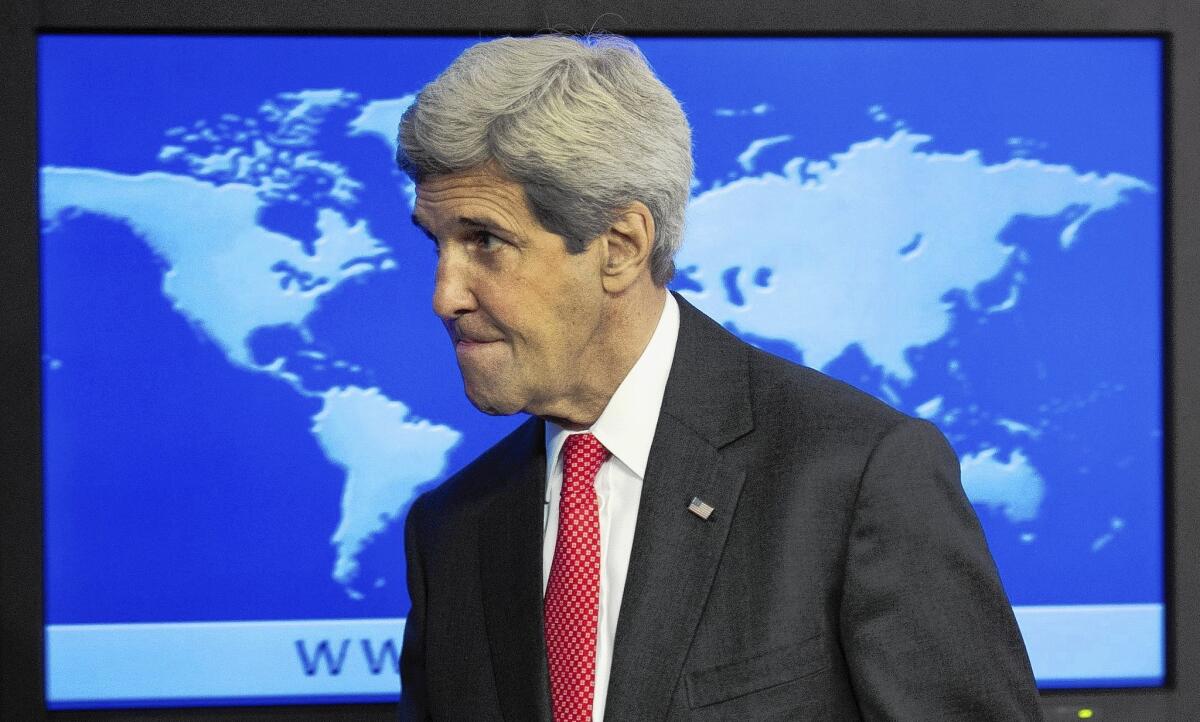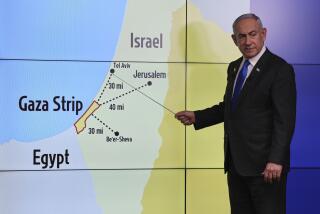Gaza Strip fighting defies diplomatic solutions big and small

Diplomats searching for a way to end the fighting in the Gaza Strip have been working on two possible solutions: a bare-bones deal that offers Israel and Hamas little but a halt to fighting, and a more ambitious agreement that would try to meet some of each side’s longer-term goals. Neither approach seems to be working.
The “less for less” plan, the core of a proposal floated by Egypt in the first days of the conflict, worked in past conflicts, including the 2012 battle between Israel and Hamas, the Palestinian militant group that controls Gaza, because it gave each side a way to disengage without rewarding the other.
This time, however, both sides want to keep fighting. Israel believes it needs to eliminate Hamas’ tunnels and rocket arsenal, and Hamas thinks it can win political concessions from the Israelis as casualties mount.
Each side has made it clear it wouldn’t be satisfied with a return to the status quo, which for Israel would mean continued vulnerability to Hamas rocket fire and for Hamas would mean a continuation of the blockade on most commerce with Gaza. A status quo agreement would set up conditions for a new war in a couple of years, both sides seem to believe.
The “more for more” idea, as seen in the plan offered in recent days by U.S. Secretary of State John F. Kerry, has also been a tough sell. It would involve some measure of disarmament by Hamas in exchange for a freeing of some restrictions on Gaza and probably a large, international aid package.
That sort of deal would meet goals each side desires, but neither side has been willing to see the other rewarded.
“Israel doesn’t want to give Hamas anything that would make it stronger, or give it a political gain. And that’s exactly what Hamas is looking for,” said Robert Danin, a longtime U.S. diplomat in the Middle East who is now with the Council on Foreign Relations. “So they’re locked in a zero-sum game.”
The prospects for a deal have looked especially bleak as the week began.
Israeli Prime Minister Benjamin Netanyahu, in a television appearance Monday, said the military offensive might take “a long time.”
Kerry returned to Washington over the weekend with just a few hours’ halt in fighting to show for six days of shuttle diplomacy in the Middle East and Europe.
More than 1,050 Palestinians, most of them civilians, have been killed in three weeks, officials said Monday. On the Israeli side, at least 48 soldiers and three civilians have died, including a foreign worker.
Although the spiraling death toll has increased international pressure for a deal, the diplomatic mechanism has appeared damaged. Particularly troubling for future peacemaking efforts has been a degree of open conflict between the United States and Israel not seen in many years during a crisis of this sort.
Israeli officials quoted anonymously in the Israeli news media attacked Kerry in surprisingly personal terms over the weekend. Channel 2 quoted unidentified Cabinet ministers on Saturday saying he was “negligent” and “incapable of handling the most basic matters.”
They contended that Kerry’s cease-fire proposal was slanted toward the Palestinians and didn’t consider Israel’s need to continue destroying the two dozen or so tunnels built by Hamas into Israeli territory. Israeli officials and news reports said Monday that at least five militants from Gaza had managed to cross into Israel, probably via an infiltration tunnel originating in eastern Gaza.
Kerry and other U.S. officials pushed back strongly, condemning Israelis for leaking the proposal and insisting that what the Israelis were describing as a final offer was only an initial draft.
The criticism was “not the way allies and partners treat each other,” State Department spokeswoman Jen Psaki said.
The criticism of Kerry has come from all parts of the Israeli political spectrum and reflects in part deep feelings about what Israelis see as a grave military threat, said Michele Dunne, a Mideast specialist at the Carnegie Endowment for International Peace.
It may also reflect a sense among some officials in Israel that “if you push back against this administration, it works,” she said. She noted that the administration abandoned its call for a freeze on Israeli settlements in the West Bank in 2009 after strong push-back from Israeli leaders and their American supporters.
Those frictions aren’t the only obstacles in the path of a diplomatic solution.
In past Mideast crises, one or more world powers has usually had significant leverage over key players, which has helped to bring about an agreement. If not the United States, then Egypt or Saudi Arabia could step into the mediator role.
This year, however, the United States is seen in the region as a country seeking to reduce its international role. The military government in Egypt is anti-Islamist and lacks the special influence over Hamas that its predecessors had. It also wants to limit its involvement in Gaza, which it views as a costly burden.
And the regional powers that Kerry has been trying to bring together for a deal are suspicious of one another. Egypt, Saudi Arabia and Israel have all warned Kerry about bringing Qatar and Turkey into the diplomacy because of their economic and political support for Hamas.
“There is a vacuum in terms of anybody stepping in and playing an effective role in ending this,” said Marwan Muasher, a former Jordanian foreign minister and now an analyst with the Carnegie Endowment.
Although no ideal mediator appears to exist, the alternative appears grim: If the U.S. and its negotiating partners aren’t able to find a diplomatic deal, the fighting could continue until the outcome is determined on the battlefield, with a considerably higher death toll, analysts say.
In Israel, so much support exists for continued efforts to destroy Hamas’ weapons and tunnels that Netanyahu might not be able to win a majority of his Cabinet to pass a resolution for a cease-fire, warned Dan Arbell, a 26-year veteran of the Israeli foreign service.
And Israeli military officials have been saying that Hamas has the weapons and commitment “to go some distance” for its military goals, said Arbell, now a scholar in residence at American University’s School of International Service in Washington.
Danin, of the Council on Foreign Relations, said Israelis have discovered that Hamas has greater military capabilities than they realized, and that has caused them to view the fight ever more seriously, not as a campaign but “as a war we must win.”
“One of the dangers,” he said, is that “as this goes on, the price they demand for ending it goes up.”
More to Read
Sign up for Essential California
The most important California stories and recommendations in your inbox every morning.
You may occasionally receive promotional content from the Los Angeles Times.










